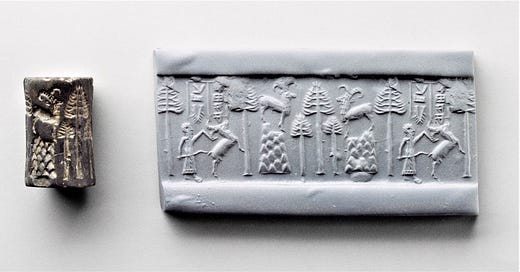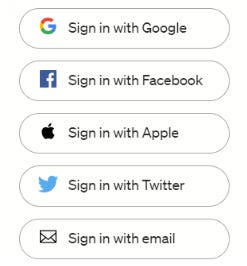Smile ID: Serving the new digital African economy
The growth stage pan-African startup is building critical digital identity verification infrastructure across Africa.
Afridigest is your intelligent guide to Africa’s tech ecosystem. We provide ideas, analysis, & insights for Africa-focused founders, executives, and investors.
Today’s newsletter shines a spotlight on pan-African digital KYC and identity verification platform Smile ID. It includes an audio interview with Mark Straub, the company’s Co-founder & CEO, so make sure to have your headphones ready.
And be sure to click through to read the essay he recently published, plus Smile ID’s new State of KYC in Africa report.
(P.S. Should we kill or keep doing startup spotlights: 😡 Kill • 😑 Meh • 😃 Keep)
If you were a Sumerian living roughly 6,000 years ago in, say, Uruk — the capital city of Mesopotamia and perhaps the first ‘true city’ in the world — there's one thing you'd carry with you at all times.
Regardless of who you were — a member of the ruling class, a trader, a craftsman, a priest, a soldier, even a slave — you’d be sure to have with you a small cylinder, about an inch to two inches long, made from some sort of hard material. Usually wood, bone, ivory, metal, or various types of semiprecious stone.
But whatever the material, it’d be carved with intricate designs that depicted who you were in society, what you were known for, and in many cases your name. So if you wove clothes, for example, your cylinder might depict a spider weaving a web.
Perhaps you’d tie it around your neck or wrist with a strip of leather, or pin it to your clothes as jewelry (if it was made from fancy enough materials), but regardless of how you carried it, your cylinder was an integral part of your daily life.
Today we call these Sumerian artifacts ‘cylinder seals,’ and they were early forms of ID.

And like signing a document today, rolling your cylinder seal against clay was done in those times to finalize daily transactions and legitimize personal & business dealings.
So if you lost your identity seal, you’d hurry to a city official to record the date and time of loss so that transactions done by bad actors would be deemed invalid.
Fast forward to today and the role of identity hasn’t changed much.
We use identification to engage in transactions with those we know and trust, and to protect us from those we don’t.
We’re a social species and identity is at the core of all human-to-human interactions; it’s what binds us to our reputations and our reputations are what earns trust. And, increasingly in modern times, identity is also at the foundation of human-to-machine interactions.
“Digital identities are foundational elements of our shared digital future.”
— Derek O’Halloran, Head of the World Economic Forum Initiative on Shaping the Future of the Digital Economy.
Today, robust digital identity is one of the key components of a well-functioning digital economy.
As economic activity everywhere becomes increasingly digitized and more high-value transactions happen online, being able to verifiably prove that you are who you say you are is essential to establishing trust at a distance and gaining access to a wide variety of commercial & social services.
Once identity-based trust is established at scale, digital economies thrive.
But an estimated 850 million people worldwide don’t have official identification — and nearly 60% of them are in sub-Saharan Africa.
And even for African consumers that have government-issued IDs, many KYC processes remain manual and offline — with few reliable options for identity verification at scale across various document types and countries.
So it can be hard for high-growth businesses across the continent to onboard customers and counter fraud efficiently.
It’s against this backdrop that pan-African digital KYC and identity verification platform Smile ID (formerly Smile Identity) was founded in 2017.
“We're building a core piece of infrastructure so that somebody else doesn't have to come back and build it three years, four years, five years from now,” Mark Straub, Smile ID’s CEO, tells me.
“I was an investor in a number of companies across Africa before I started the company. And I saw investee companies constantly running into this onboarding problem,” he explains.
So Straub teamed up with co-founder Bill Bares to build a frictionless onboarding solution that makes it easy for African consumers to prove their identity and participate in the continent’s fast-growing digital economy.
Straub, Bares, and other early team members focused initially on machine learning & computer vision research in Nigeria, Kenya, and Tanzania to build a facial recognition system tailored to African consumers.
And today, six years later, the digital KYC and identity verification platform is Africa’s largest — combining facial & biometric verification, document verification, and liveness checks with numerous government, bank, and telco database integrations.
Smile ID’s customers use the platform to verify customer identities against local databases across over a dozen countries in Africa. And that customer list reads like a who’s who of African tech.
Among the fintechs it serves are Paga, Yellow Card, Chipper Cash, Paystack, Luno, Fairmoney, Umba, and Kuda Bank. And the company announced raising a $20 million Series B round earlier this year while announcing last week that it has now completed over 75 million verifications to date.
What’s behind the company’s success?
“It's being rooted in and understanding what it takes to serve customers in Africa, but also bringing the best tools, capital, and talent that we can from outside the continent to complement what we have locally. That's the combination that has allowed us to quite frankly grow much faster than any of our competitors and achieve a scale that I don't think anyone else in Africa has achieved when it comes to identity,” Straub says.
“We’re serving the new digital African economy and the people who are building that economy. And the vision is really to do that by building a set of software tools that are better, faster, and easier to use.”
Given Smile ID’s traction to date, you’d be forgiven for thinking that Africa’s identity landscape is booming. But the reality is that, while countries across the continent are increasingly embracing modern ID initiatives, the identity landscape across Africa is very much still in the early stages of development.

So you can imagine the challenges six years ago when Smile ID got its start.
I spoke with CEO Mark Straub about Smile ID’s early days, its ongoing evolution, and more, and what follows below are audio clips & text highlights of our conversation. (Be sure to press play to hear Mark’s responses in full in his own voice.)
What problem did Smile ID solve initially and what did the identity landscape look like across Africa when the company was founded?
“When we started the company, the primary problem was that if [a company] wanted to onboard a lot of users quickly, [they] would run into lots of fraud… You couldn't just look up [all the required identity verification information] in some database… Bits and pieces of information were in different places and not easily accessible by developers or people building financial services solutions.”







